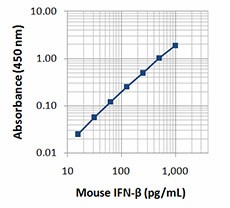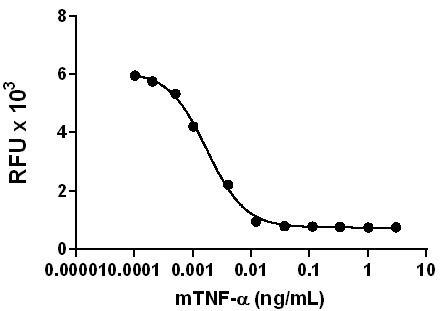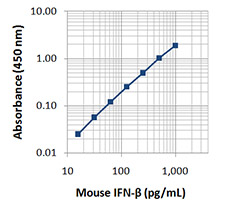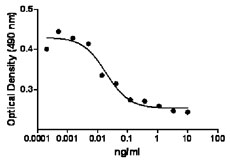- Regulatory Status
- RUO
- Other Names
- Interferon-β, Fibroblast interferon (Fi-IFN, F-IFN), Type-1 interferon, acid-stable interferon, R1-G1 factor, IFN-b, IFN-beta
- Ave. Rating
- Submit a Review
- Product Citations
- publications

Interferon-β is a member of the type I interferon class. Type I IFNs are involved in the innate immune system, being released non-specifically during the early stage of infection in response to stimuli such as viruses, dsRNA, LPS, and bacterial components. Once secreted by virus-infected or activated cells, they bind to the IFNα/β receptor (IFNAR), which is found on almost all cell types, and, via the JAK-STAT pathway, induce the expression of hundreds of IFN-stimulated genes (ISGs). While the function of many of these proteins remains to be elucidated, a hallmark of type I IFNs is their anti-viral activities, both general and specific against particular viruses. Type I IFNs also regulate cell growth and apoptosis, and exert various immunomodulatory and inflammatory effects. As such, they are also clinically relevant, both as therapeutics and as targets of inhibition for the treatment of various autoimmune diseases and cancer.
Mouse IFN-β is a ~20 kD monomeric glycoprotein. It has 50% amino acid sequence homology with mouse IFN-α, its closest related protein, and 62% homology with human IFN-β. IFN-β is currently the therapeutic of choice for treating multiple sclerosis.
Product Details
- Source
- Mouse IFN-β1, amino acids Ile22-Asn182 (Accession# NM_010510.1) was expressed in 293E cells. The carboxy-terminal has a TG8HisGGQ-tag.
- Molecular Mass
- The 175 amino acid recombinant protein has a predicted molecular mass of approximately 21.2 kD. The DTT-reduced and non-reduced protein migrates at approximately 36 kD by SDS-PAGE. The N-terminal amino acid is Ile.
- Purity
- >98%, as determined by Coomassie stained SDS-PAGE prior to lyophilization.
- Formulation
- Lyophilized in sterile-filtered PBS, pH 7.2, containing 1% BSA, 0.09% sodium azide, and protease inhibitors.
- Concentration
- Lot-specific (to obtain lot-specific concentration and expiration, please enter the lot number in our Certificate of Analysis online tool.)
- Storage & Handling
- Unopened vials can be stored between 2°C and 8°C until the expiration date. Prior to use, reconstitute the lyophilized powder with 0.2 mL of PBS containing a carrier protein (e.g., 1% BSA, protease free), pH7.4. Re-cap vial, vortex. Allow the reconstituted standard to sit at room temperature for 15 minutes, vortex again to mix completely. The reconstituted standard stock solution can be aliquoted into polypropylene vials and stored at -70°C for up to one month. Do not re-use diluted standards. Avoid repeated freeze/thaw cycles.
- Application
-
ELISA - Quality tested
- Recommended Usage
-
Each lot of this protein is quality control tested by ELISA assay. For use as an ELISA standard, a standard curve comprised of two-fold dilutions from 1 ng/ml to 15.6 pg/ml is suggested. It is recommended that each lot of reagent be titrated for optimal performance for each application.
- Application Notes
-
This IFN-ß protein is useful as a standard for a mouse IFN-ß sandwich ELISA, using unlabeled Poly5192 antibody (Cat. No. 519202) for capture and biotinylated MIB-5E9.1 antibody (Cat. No. 508105) for detection.
-
Application References
(PubMed link indicates BioLegend citation) -
- Mounce BC, et al. 2014. J. Virol. 88:2268. PubMed
- Product Citations
-
Antigen Details
- Structure
- Interferon; 26-35 kD (Mammalian)
- Distribution
-
Fibroblasts, epithelial cells
- Interaction
- Broad, includes NK cells, T suppressor cells, activated monocytes
- Ligand/Receptor
- IFNα/βR (IFNAR-1, IFNAR-2)
- Biology Area
- Apoptosis/Tumor Suppressors/Cell Death, Cell Biology, Signal Transduction
- Molecular Family
- Cytokines/Chemokines
- Antigen References
-
1. Nagarajan U. 2011. Crit. Rev. Immunol. 31:459.
2. Honda K, et al. 2005. Int. Immunol. 17:1367. - Regulation
- Upregulated by viruses, double-stranded RNA, micro-organisms, TNF, IL-1
- Gene ID
- 15977 View all products for this Gene ID
- UniProt
- View information about IFN-beta on UniProt.org



















Follow Us